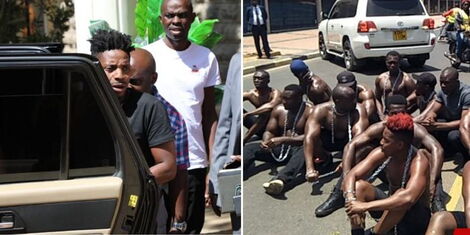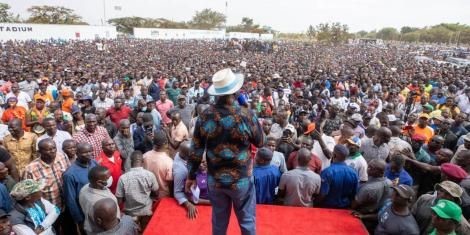-
Raila Odinga addresses residents of Kisumu Town on February 18, 2023. TWITTER RAILA ODINGA
-
Azimio la Umoja party leader Raila Odinga on Wednesday, February 22, issued six demands to President William Ruto, failure to which the opposition would lead the country to mass action in 14 days.
Speaking at Jeevanjee Gardens, Nairobi County, Raila noted that food subsidies must be restored to cushion Kenyans from the high cost of living.
He pointed out that taxes subjected to Kenyans must come down within 14 days.
The ODM party leader noted that owing to the rising cases of learners dropping out of school, the government ought to subsidise fees to realise a 100 percent transition.
Raila detailed that electoral deceit must end. He called for servers to be opened and audited under the auspices of a reputable firm or organisation failure to which the opposition would lead the people to restore their authority and voice.
He also called for the ongoing process of reconstituting the Independent Electoral and Boundaries Commission (IEBC) to stop.
In its place, Raila advocated for a bipartisan task force to be put in place to oversee the restructuring the electoral body. He claimed that the move would end its monolithic operations.
"If demands are not heeded within 14 days, we shall lead Kenyans to mass action across the country to restore sanity," Raila stated.
While addressing his supporters, Raila referenced Amos 5:11 and reiterated Prophet Amos' warning:
"You trample the poor, stealing their grain through taxes and unfair rent. Therefore, though you build beautiful stone houses, you will never live in them. Though you plant lush vineyards, you will never drink wine from them," Raila quoted the Bible.
Raila also alleged a political witch-hunt against politicians allied with former president Uhuru Kenyatta, pointing out former Interior CS Fred Matiang'i and his lawyer, Danstan Omari.
"You see how they keep punishing Uhuru's former Cabinet. Recently, we saw what happened to Matiang'i. Now they want to inflict harm on Danstan Omari as the Directorate of Criminal Investigations (DCI) wrote to him to investigate him. We want to tell them to leave Matiang'i and Omari alone," he noted.
The ODM party leader lauded comedian Eric Omondi and added that it was his constitutional right to hold peaceful demonstrations.
"Now Eric Omondi went to Parliament to defend Kenyans' rights and have peaceful demonstrations. We want to show Ruto that peaceful demonstration is a right," Raila warned.
 A photo collage of Eric Omondi in the company of other activists during a protest along Parliament Road on Tuesday, February 21, 2023. DAILY NATION -TWITTER/STANDARD DIGITAL, By Brian Kimani, Kenyans.co.ke
A photo collage of Eric Omondi in the company of other activists during a protest along Parliament Road on Tuesday, February 21, 2023. DAILY NATION -TWITTER/STANDARD DIGITAL, By Brian Kimani, Kenyans.co.ke






